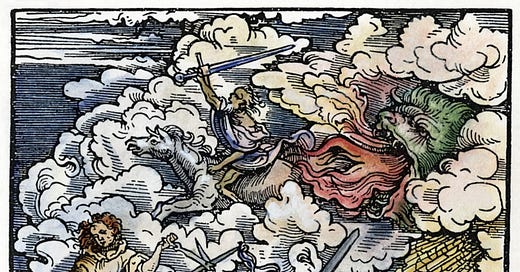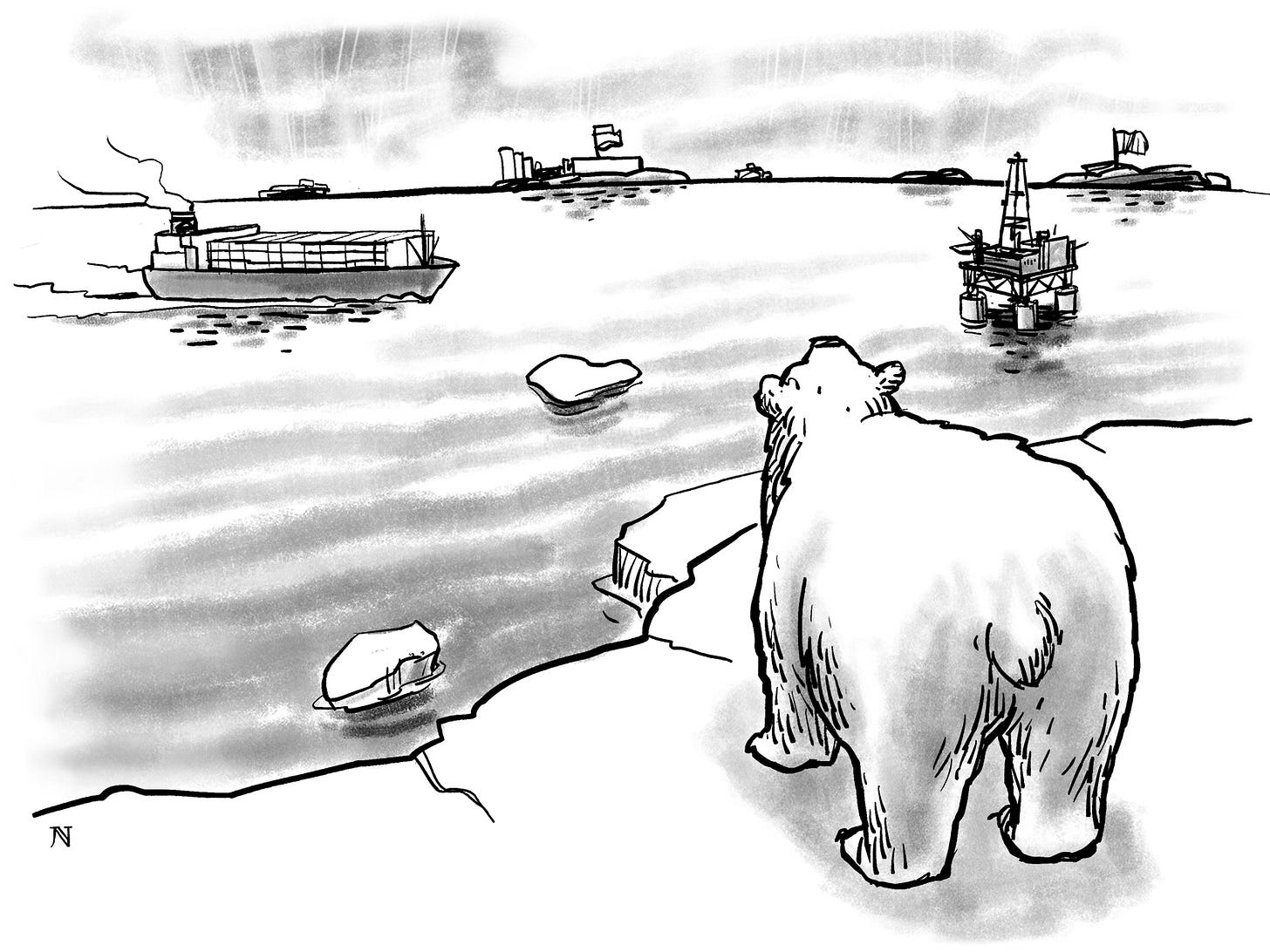Everybody likes an apocryphal story
Just don't let them rule your world -- much less determine its future
When you try to model and forecast the future of the world, you’re always looking for apochryphal stories even as you seek to avoid contracting the irrational fervor of their proponents and/or superspreaders. The definition of apochryphal is a story or statement of doubtful authenticity, although widely circulated as being true. The debunkers of apocryphal stories are almost equally dangerous to sound thinking because they often use the falseness of the story to disprove larger truths by basically “proving” that, if Evidence A is false, then so too is the larger story it was cited as illuminating.
A classic example here are the apocryphal stories surrounding the extinction of polar bears stemming from climate change. Evidence A (declining polar bear populations) proves climate change is real and dangerous, so … if disproven, then so too is the notion that climate change is all that real or all that dangerous.
The truth is that some sub-species of polar bears are growing in population, some are stable, some are declining, and on some we just don’t have the data. Superspreaders of the notion that all polar bears are being wiped out are thus dismissed by those who cherry-pick the better population numbers. Both sides cry bullshit, and the actual story gets lost to the world of alternative facts.
Meanwhile, the wider scientific consensus is clear: overall, polar bears are not doing well and are likely to do more poorly as their preferred habitat shrinks across the Arctic and more human activity moves in. Like all other species, polar bears will adapt, move, and/or die, so it’s easy to go overboard with stories along any of those three lines.
The point is, all possible global futures are incredibly complex, comprising dozens/hundreds/thousands/millions/etc. sub-narratives whose combined churn yields the future reality we all seek to shape and thus ultimately encounter (dare I say, enjoy?). While storytelling is a key tool for properly contextualizing those many possible pathways, you — as a strategic thinker — are always seeking not to get lost in any one tale (or “tail” that ends up unduly “wagging the dog”).
As I argued the process in Great Powers (2009):
Grand strategists do not entertain, much less succumb to, single-point-failure doomsaying, because systematic thinking about the future means you’re not “for” or “against” issues like peak oil or global warming or resource scarcity but instead accept the implied dynamics of the change that has been triggered and factor them in accordingly.
When it comes to thinking about China’s challenge to the US, the simplest, most accessible apocryphal story is Beijing’s always-looming military takedown of Taiwan. Within that tale, we find an embedded apocryphal tale concerning Taiwan’s dominant global share in high-end semiconductor production (I first ran into that back in my scenario work on the Y2K problem, during which the 1999 earthquake in Taiwan exemplified a lot of those fears).
Pulling our lens back further, we bump into all sorts of apocryphal notions concerning China’s ability to — post its takedown of Taiwan — dominate the wider littoral and maritime Indo-Pacific space, “prove” its now-unstoppable military capacity to the world, send that entire world order into “chaos,” and the like.
In short, by attaching so many apocryphal stories to the Taiwan scenario, we in the West and particularly in the US national security community have built it up into this master narrative that determines our global future, depending on how it goes down.
Is that overkill? In my mind, yeah. In a world facing demographic collapse and climate change, it feels like rearranging deck chairs on the Titanic.
There’s just no way that any plausible Taiwan scenario unfolds so that it either “breaks” or “shatters” or “re-orders” our present world system (of America’s creating and now marked by serious multipolarity that, frankly, freaks out too many of us Americans). And yeah, I include in that analysis — by ruling it out — the scenario that sees Beijing and Washington engaging in strategic nuclear war over Taiwan. As Ukraine has proven with Russia, those escalation fears are not warranted.
Once again employing that way-back-machine logic of going back in time and presenting you with the actual outcomes and then asking you to take or not take that deal, let’s think back to how we would have interpreted the possibility of Russia’s full-scare invasion of Ukraine say, back in the year 2010.
Back then, the world was still very much caught up in the aftermath of the Great Financial Crash of 2008 and the follow-on Great Recession. Predictions abounded that the world was heading for a repeat of the 1930s Great Depression, and we were all worried about the right Archduke Ferdinand-like trigger to come along (recall that we’re just two years past Putin’s military incursion into Georgia) and put that nuclear armageddon into motion.
If I had presented you with the scenario of an attempted full-scale, regime-changing takedown of Ukraine by the Russian military, then you, I, and pretty much everyone else would be thinking this is the start of WWIII, right? NATO would respond, Moscow would freak out, and nukes would start flying because there’s no way Putin would accept anything less than complete success as the casualties mount up (if they were to mount up at all because we all assumed any such Russian takedown would be swift and conclusive, thus the short pathway to WWIII).
Now, imagine me trying to sell you the alternative scenario that Russia would fail in its takedown attempt, lose troops on a scale equivalent to America’s losses across WWII, and get stuck in this WWI-like trench warfare stalemate where the dominant mode of killing is via drones. Imagine I tell you that it gets so bad that, after emptying its jails for conscripts, Russia has to turn to North Korea for fresh meat to jam into its grinder, Meanwhile, NATO is funneling arms to Ukraine like crazy.
Certainly, that’s WWIII already, right?
And sure, we have those apocryphal stories and their purveyors out there right now.
Except it's not WWIII.
And now, Trump’s re-election gives Putin the way out, along with dangling Trump’s much-desired Nobel Peace Prize in front of his face: the West chooses to “reward” Putin’s land grab just like it forgave him in both Georgia and Ukraine’s Crimea previously.
Why?
Because that’s the multipolar world we now live in, and that’s also the superpower rule-set we promulgated for two solid decades following the Cold War: nuclear superpowers get to play Leviathan in their spheres of influence.
Now, we didn’t actually spell that notion out during our Global War on Terror (GWOT), but we most definitely set it in motion.
Our original notion was that ONLY America had that sort of role around the planet — you know, the “sole superpower” with 800 or so military bases around the world and explicitly dedicated to the notion that state sovereignty must be protected the world over lest … you know, WWIII starts up.
But, being American, we went overboard with the GWOT, displayed our usual control-freak tendencies in the post-takedown occupations of both Afghanistan and Iraq — where we went out of our way to exclude the inevitable “others” who subsequently stepped in once we inevitably pulled out — and thus began our long strategic withdrawal from the world starting with Barack Obama’s election in 2008.
Into the natural regional vacuums we created by our systematic pull-back, rising and risen powers (both great and “super”) inevitably stepped up and staked (or just reminded us of ) all manner of claims. Some we tolerate and even support, like the Israel-v-Hamas dynamic embedded within the larger Israel/KSA/UAE-v-Iran dynamic. Others we resist, like the Russia-v-Ukraine dynamic embedded with the larger NATO-v-“evil axis” dynamic.
In the end, though, we don’t really have the say we once did. We gave that up progressively with Obama, then Trump, then Biden, and now most clearly again with Trump. The American voting public has been very consistent in that regard.
So, yeah, we will let Israel eliminate Gaza and ultimately the West Bank, and, yeah, we will reward Putin’s second land-grab in Ukraine.
And, yeah, under the right conditions — with the apocryphal 2027 “deadline” for China to take down Taiwan now feeling far more plausibly stomach-able by a Trump-dominated Washington, we will do the same with that certain-to-produce-WWIII trigger scenario.
Except it won’t.
Now, of course, in my attempt to downplay these apocryphal scenarios, I inevitably generate a larger one in your head: a world gone mad.
But ask yourself these unpleasant questions:
Keep reading with a 7-day free trial
Subscribe to Thomas P.M. Barnett’s Global Throughlines to keep reading this post and get 7 days of free access to the full post archives.






